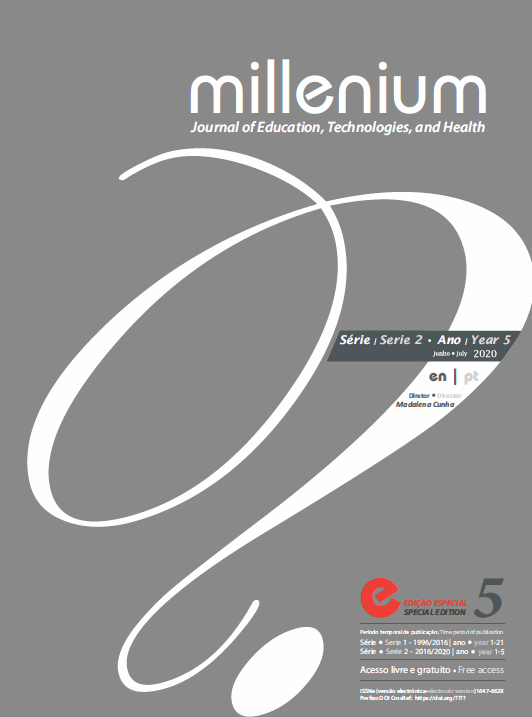Health, family and school
mental health of children from refugee families
DOI:
https://doi.org/10.29352/mill0205e.20.00308Keywords:
school mental health, refugees, family nursingAbstract
Introduction: Mental health is a priority in public health. Nowadays it is important to know its prevalence in refugees health and to intervene avoiding its perpetuation in future generations. (Frazel, 2002; Solheim, 2016).
Objectives: To know the prevalence of mental illness in children from refugee families.
Methods: Classic literature review focusing on the state of the art of the mental health of refugee children.
Results: Half of the refugee children show symptoms of mental illness, such as post-traumatic stress, anxiety, depression, with a prevalence and varied manifestations, such as adjustment, cognitive, learning and language problems, unreported, late, cumulative to educational detention and disadvantage, affecting one in ten children. (Graham, Minhas, Paxton, 2016).
New perspectives/Guidelines: Primary prevention should take place in the school context, a space for connection to parents and the community, for integration, inclusion, education, and promotion of child and emotional development, such as building self-esteem and identity, facilitating social and peer relationships, and monitoring of resilient and adaptive behaviors (Fazel & Stein, 2009; World Health Organization, 2018 a)b)).
Conclusions: In order to provide comprehensive assistance to refugee children and their families, the holistic, systemic and cross-cultural praxis of the family nurse should be promoted in order to satisfy their needs and promote child development and the mental health of refugee children, integrating the school context, the center of the proximal support network.
Downloads
References
Albuquerque, C. (1982). Portugal na vanguarda da promoção da saúde mental de crianças e adolescentes. Acta Paulista de Enfermagem, 31(5), 3-5. Acedido em https://doi.org/10.1590/1982-0194201800064
Bryant, R. A., Edwards, B., Creamer, M., O’Donnell, M., Forbes, D., Felmingham, K. L., & Pavlovic, D. (2018). The effect of post-traumatic stress disorder on refugees’ parenting and their children’s mental health: A cohort study. Lancet Public Health, 3(5), e249-e258. DOI: 10.1016/S2468-2667(18)30051-3.
Cox, K. S., Sullivan, C. G., Olshansky, E., Czubaruk, K., Lacey, B., Scott, L., & Van Dijk, J. W. (2018). Critical conversation: Toxic stress in children living in poverty. Nursing Outlook, 66(2), 204-209. Acedido em https://doi.org/10.1016/j.outlook.2018.02.009
Fazel, M. A. S., & Stein, A. (2002). The mental health of refugee children. Archives of Disease in Childhood, 87(5), 366-370. Acedido em https://www.ncbi.nlm.nih.gov/pmc/articles/PMC1763071/pdf/v087p00366.pdf
Fazel, M., Doll, H., & Stein, A. (2009). A school-based mental health intervention for refugee children: An exploratory study. Clinical Child Psychology and Psychiatry, 14(2), 297–309.
Goldin, S. (2008). Living in the present with the past : Mental health of Bosnian refugee children in Sweden (Dissertação de mestrado, Umeå University, Sweden). Acedido em https://www.researchgate.net/publication/303685780_Living_in_the_present_with_the_past_mental_health_of_Bosnian_refugee_children_in_Sweden
Goodman, R., & Scott, S. (2012). Child and adolescent psychiatry (3rd ed.). West Sussex, UK: Wiley-Blackwell. Acedido em http://www.youthinmind.info/GoodmanScott3rdEdition2012.pdf
Graham, H. R., Minhas, R. S., & Paxton, G. (2016). Learning problems in children of refugee background: A systematic review. Pediatrics, 137(6), e20153994-e20153994. Acedido em http://pediatrics.aappublications.org/cgi/doi/10.1542/peds.2015-3994
Downloads
Published
How to Cite
Issue
Section
License
Authors who submit proposals for this journal agree to the following terms:
a) Articles are published under the Licença Creative Commons (CC BY 4.0), in full open-access, without any cost or fees of any kind to the author or the reader;
b) The authors retain copyright and grant the journal right of first publication, allowing the free sharing of work, provided it is correctly attributed the authorship and initial publication in this journal;
c) The authors are permitted to take on additional contracts separately for non-exclusive distribution of the version of the work published in this journal (eg, post it to an institutional repository or as a book), with an acknowledgment of its initial publication in this journal;
d) Authors are permitted and encouraged to publish and distribute their work online (eg, in institutional repositories or on their website) as it can lead to productive exchanges, as well as increase the impact and citation of published work
Documents required for submission
Article template (Editable format)





